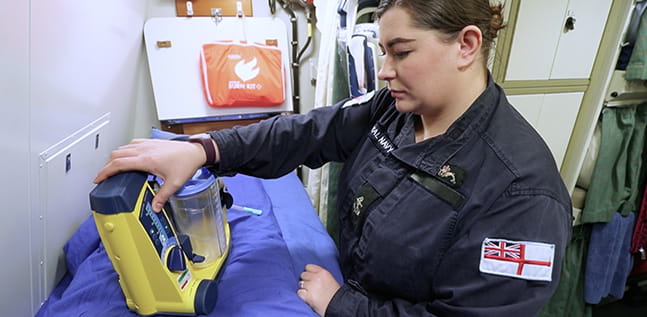Medical Assistant (Submariner)
Working predominantly on submarines, you are responsible for providing routine and emergency medical care to the crew in a challenging environment as part of an elite and highly respected team.
- £18,000 - £68,000
- No qualifications
- Submarine Service
- Medical
- Rating level
£5,000 Bonus
£25,200
£68,000
Zero
6 weeks
Free
Travel

I’m constantly learning on the job, much quicker than I would anywhere else. Being a submariner means I’ve learned another whole set of skills, too.
Role details
What you’ll do
You’ll embark on a medical career that offers more variety and adventure than you’d ever experience in civilian medicine. And doing this role as a submariner sets it even further apart.
You’ll need to think on your feet in challenging situations, within the operational confines of a state-of-the-art submarine.
Being a submariner means joining an elite team like no other, with your crewmates looking to you to safeguard their health and wellbeing, whatever the mission, wherever you are in the world.
Your role
- Work on vessels at the forefront of our nation’s defence: a Vanguard class ballistic missile submarine (our nuclear deterrent) or an Astute class attack submarine.
- Make a real difference to the health and wellbeing of your crewmates, as you carry out highly classified global missions.
- Work across all medical departments, learning directly from specialists in a number of fields.
- You’ll become more than a medic, monitoring the boat’s life support systems such as air and water generation, plus radiation on our nuclear vessels.
Pay & benefits
- A £5,000 bonus for earning your 'Dolphins' - the mark of the Submarine Service
- A salary of at least £25,200 as soon as you finish training
- Earn in excess of £68,000 as your career progresses
- Additional Submariner pay each day at sea when fully qualified
- An excellent pension scheme
- Six weeks of paid holiday every year
- Free medical and dental care
Skills for life
Qualifications you'll gain
- Study for GCSEs, A-Levels, NVQs or even a degree, paid for by us
- Gain specialist vocational qualifications as your career progresses
Skills you'll develop
- Learn about first aid, environmental and preventative medicine, anatomy and physiology
- Develop your skills in specialist areas, like pharmacy or nursing
Eligibility
- You’ll need to be aged 17 to 39
- No qualifications are required for this role
- You must be a United Kingdom citizen or British Dual National. Dual Nationality restrictions do apply
- You need to be a minimum height of 157cm
- A Body Mass Index (BMI) between 18 and 28 (between 17 and 27 if under 18)
Skills & Interests
- A quick thinker with a passion for helping people
- Great team players who thrive on working with others
- Enthusiasm for working in high-pressure environments
- Hands-on people who can react quickly in an emergency
Joining Process
From picking your role to starting on your first day, these are the steps you'll take to join as a rating.
Submit an application
Defence Aptitude Assessment (DAA)
You’ll be tested on: Verbal Reasoning, Numerical Reasoning, Work Rate, Spatial Reasoning, Electrical Comprehension and Mechanical Comprehension.
To prepare, you can practise the DAA
Interview
Candidate Preparation Course (CPC)
Start training
Career Progression
Promotion to Petty Officer (Medical Assistant) (POMA) will be on merit. As a POMA you could have an instructor's role
Got a question?
Our virtual recruiter is available to answer your questions 24 hours a day
